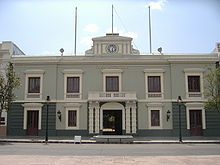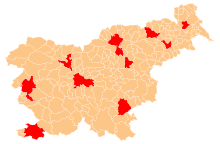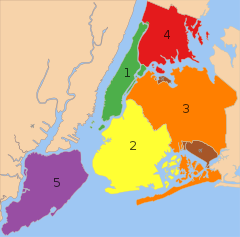

A municipality is usually a single administrative division having corporate status and powers of self-government or jurisdiction as granted by national and regional laws to which it is subordinate.
The term municipality may also mean the governing body of a given municipality. [1] A municipality is a general-purpose administrative subdivision, as opposed to a special-purpose district.
The English word is derived from French municipalité, which in turn derives from the Latin municipalis, [2] based on the word for social contract ( municipium), referring originally to the Latin communities that supplied Rome with troops in exchange for their own incorporation into the Roman state (granting Roman citizenship to the inhabitants) while permitting the communities to retain their own local governments (a limited autonomy).
A municipality can be any political jurisdiction, from a sovereign state such as the Principality of Monaco, to a small village such as West Hampton Dunes, New York.
The territory over which a municipality has jurisdiction may encompass:
- only one populated place such as a city, town, or village
- several such places (e.g., early jurisdictions in the U.S. state of New Jersey (1798–1899) as townships governing several villages, municipalities of Mexico, municipalities of Colombia)
- only parts of such places, sometimes boroughs of a city, such as the 34 municipalities of Santiago, Chile. [3]
Political powers
Powers of municipalities range from virtual autonomy to complete subordination to the state. Municipalities may have the right to tax individuals and corporations with income tax, property tax, and corporate income tax, but may also receive substantial funding from the state. In some European countries, such as Germany, municipalities have the constitutional right to supply public services through municipally-owned public utility companies. [4]
Terms in various countries


Municipality
Terms cognate with "municipality", mostly referring to territory or political structure,[ clarification needed] are Spanish municipio (Spain) and municipalidad (Chile), Catalan municipi, Portuguese município.
- In Brazil, a município is the local government, recognized by the Brazilian Federal Constitution and established through state constitutions. It is the smallest territorial division holding executive and legislative powers. Since the Constitution of 1988, all municípios are members of the federation. Colloquially, the local population uses the terms municipality and city interchangeably, although the constitution defines "city" as the seat of the municipality. [5]
Commune
In many countries, terms cognate with "commune" are used, referring to the community living in the area and the common interest. These include terms:
- in Romance languages, such as French commune ( France, French-speaking areas of Belgium and Switzerland, French-speaking countries of Africa, e.g. Benin), Italian comune ( Italy), Romanian comună ( Romania), and Spanish comuna ( Chile);
- in Germanic languages such as German Kommune (in political parlance), Swedish kommun ( Sweden), Faroese kommuna ( Faroe Islands), Norwegian, Danish kommune ( Norway, Denmark);
- the more remote cognates gemeente in Dutch ( Netherlands), Gemeng in Luxembourgish ( Luxembourg) and Gemeinde in German (the official term; Germany);
- Finnish kunta ( Finland).
- Ukrainian hromada.
- and Polish gmina.
The same terms "Gemeente" (Dutch) or "Gemeinde" (German) may be used for church congregations or parishes, for example, in the German and Dutch Protestant churches.
Other terms
In Greece, the word Δήμος (demos) is used, also meaning 'community'; the word is known in English from the compound democracy (rule of the people).
In some countries, the Spanish term ayuntamiento, referring to a municipality's administration building, is extended via synecdoche to denote the municipality itself. [6] In Moldova and Romania, both municipalities ( municipiu; urban administrative units) and communes ( comună; rural units) exist, and a commune may be part of a municipality.[ citation needed]
In many countries, comparable entities may exist with various names.
English-speaking
- In Australia, the term local government area (LGA) is used in place of the generic municipality. Here, the "LGA Structure covers only incorporated areas of Australia. Incorporated areas are legally designated parts of states and territories over which incorporated local governing bodies have responsibility." [7]
- In Canada, municipalities are local governments established through provincial and territorial legislation, usually within general municipal statutes. [8] [9] Types of municipalities within Canada include cities, district municipalities, municipal districts, municipalities, parishes, rural municipalities, towns, townships, villages, and villes among others. [9] The province of Ontario has different tiers of municipalities, including lower, upper, and single tiers. [10] Types of upper tier municipalities in Ontario include counties and regional municipalities. [10] Nova Scotia also has regional municipalities, which include cities, counties, districts, or towns as municipal units. [11]
- In India, a municipality or Nagar Palika is an urban local body that administers a city of population 100,000 or more. However, there are exceptions to that, as previously municipalities were constituted in urban centers with population over 20,000, so all the urban bodies which were previously classified as municipality were reclassified as municipality even if their population was under 100,000. Under the Panchayati raj system, it interacts directly with the state government, though it is administratively part of the district it is located in. Generally, smaller district cities and bigger towns have a municipality. Municipalities are also a form of local self-government entrusted with some duties and responsibilities, as enshrined in the Constitutional (74th Amendment) Act,1992.
- In the United Kingdom, the term was used until the Local Government Act 1972 came into effect in 1974 in England and Wales, and until 1975 in Scotland and 1976 in Northern Ireland, "both for a city or town which is organized for self-government under a municipal corporation, and also for the governing body itself. Such a corporation in Great Britain consists of a head as a mayor or provost, and of superior members, as aldermen and councillors". [12] Since local government reorganisation, the unit in England, Northern Ireland and Wales is known as a district, and in Scotland as a council area. A district may be awarded borough or city status, or can retain its district title.
- In Jersey, a municipality refers to the honorary officials elected to run each of the 12 parishes into which it is subdivided. This is the highest level of regional government in this jurisdiction.
- In Trinidad and Tobago, "municipality" is usually understood as a city, town, or other local government unit, formed by municipal charter from the state as a municipal corporation. A town may be awarded borough status and, later on, may be upgraded to city status. Chaguanas, San Fernando, Port of Spain, Arima and Point Fortin are the 5 current municipalities in Trinidad and Tobago.
- In the United States, "municipality" is usually understood as a city, town, village, or other local government unit, formed by municipal charter from the state as a municipal corporation. [13] In a state law context, some U.S. state codes define "municipality" more widely, from the state itself to any political subdivisions given jurisdiction over an area that may include multiple populated places and unpopulated places [14] [15] (see also: Local government in the United States#Municipal governments).
Chinese-speaking
- In the People's Republic of China, a direct-administered municipality (直辖市 in pinyin: zhíxiáshì) is a municipality with equal status to a province: Beijing Municipality, Chongqing Municipality, Shanghai Municipality, and Tianjin Municipality (see also: Direct-administered municipalities of China).
- In the Republic of China (Taiwan), a special municipality (直轄市 in pinyin: zhíxiáshì) is a municipality with equal status to a province: Kaohsiung, New Taipei, Taichung, Tainan, Taipei, and Taoyuan (see also: Special municipality (Taiwan)).
Municipalities by country
This section has multiple issues. Please help
improve it or discuss these issues on the
talk page. (
Learn how and when to remove these template messages)
|
| Country | Term | Example | Subdivision of | Quantity | Notes | Further reading |
|---|---|---|---|---|---|---|
| Brazil | município | Blumenau, | a state ( estado), which is part of a region ( região) | 5,570 | A municipality usually is divided in the urban part, the city (cidade), and the rural part. | List of municipalities of Brazil |
| Ireland | bardas, contae or comhairle | Baile Átha Cliath | a province ( cúige) or a county ( contae) | 31 | A municipality usually has authority of the whole county. In some cases however, authority is reduced to a subdivision of the county for highly populated regions, especially in Dublin (Baile Átha Cliath) | Local governments in the Republic of Ireland |
| Italy | comune | Montefiascone | a province ( provincia) which is part of a region ( regione). | 7,982 | Solely used for subdivisions of larger comuni, especially in Rome; municipio indicates the city hall; in some case, they are joined in mountain communities (comunità montane) [16] | List of municipalities of Italy |
| India | municipality, or nagar palika, or nagar parishad | Darjeeling Municipality, English Bazar Municipality | It is an administrative unit that governs a specific urban area, such as a town or city. Municipalities are established under state legislation and operate under the framework of the relevant state municipal acts. Municipalities have their own elected bodies, which typically include a mayor or chairperson and councilors representing different wards or constituencies within the urban area. | Municipal governance in India | ||
| Philippines | bayan, munisipyo or munisipalidad | Janiuay | a province (lalawigan or probinsya, except for Pateros) | 1,488 [17] | A municipality is the official name for a town and is divided into barangays. Municipalities with a larger population and income may become a city through a city charter. [18] | Municipalities of the Philippines |
| Portugal | município | Lisbon, | 18 districts and 2 autonomous regions ( Azores and Madeira) | 308 | Usually a municipality is named after its largest or historically most important town or city. Municipalities are typically much larger than the city or town after which they are named. | List of municipalities of Portugal |
| Puerto Rico | municipio | Arecibo | none | 78 | municipality consists of an urban area (termed a city or town) plus all of its surrounding barrios comprising the municipality. It has a popularly elected administration and a municipal mayor. The seat of the municipal government is located in such urban area and serves the entire municipal jurisdiction. [19] [20] | Municipalities of Puerto Rico |
| Sweden | kommun |
Stockholm Municipality |
a
region (region), the 21 self-governing areas consisting of one or more municipalities) a county (län), subdivision of the national state into 21 areas administered by County administrative boards. Regions and counties often follow the same geographical borders. |
290 | According to the
Instrument of Government, Swedish democracy is realised through a parliamentary form of government and through local selfgovernment. Municipalities are independent of the regions and counties in which they are located.
[21]
[22] Before 1971, municipalities were incorporated as either cities ( stad), market towns ( köping) or rural municipalities ( landskommun). The city-label is still used for marketing purposes, but lacks legal status and cannot be used in formal governing documents. For resident and land registration purposes, Sweden is also divided in 2 523 districts (distrikt), based on the historic Church of Sweden parishes of 1999. The districts lack authority, governing body and agency. [23] |
Municipalities of Sweden |
- In Portuguese language usage, there are two words to distinguish the territory and the administrative organ. When referring to the territory, the word concelho is used, when referring to the organ of State, the word município is used. This differentiation is in use in Portugal and some of its former overseas provinces, but it is no longer in use in Brazil, where município refers to the territorial boundaries and prefeitura is its administrative organ.
See also
- Council of European Municipalities and Regions
- Council–manager government
- Creature of statute
- Lists of municipalities
- Mayor–council government
- Municipal corporation
 Cities portal
Cities portal
References
- ^ "Municipality". Merriam-Webster.
- ^ "municipality definition". Yourdictionary.com.
- ^ "Santiago de Chile – Comunas". Mapas de Chile, Castor y Polux Ltda. Archived from the original on 20 September 2019. Retrieved 24 August 2011.
- ^ Andersen, Uwe. "Gemeinden/Kommunale Selbstverwaltung | bpb". bpb.de (in German). Retrieved 16 June 2020.
- ^ "Constituição da república federativa do brasil de 1988". www.planalto.gov.br. Retrieved 18 September 2022.
- ^ ASALE, RAE-; RAE. "ayuntamiento | Diccionario de la lengua española". «Diccionario de la lengua española» - Edición del Tricentenario (in Spanish). Retrieved 23 January 2023.
- ^ "Australian Standard Geographical Classification (ASGC)". Australian Bureau of Statistics. 28 September 2005.
- ^ "Municipal Government". The Canadian Encyclopedia > Government > Government, General > Municipal Government. Historica Foundation of Canada. 2009. Archived from the original on 13 February 2016. Retrieved 17 July 2011.
- ^ a b "Interim List of Changes to Municipal Boundaries, Status, and Names – From January 2, 2010 to January 1, 2011" (PDF). Statistics Canada. April 2011. Retrieved 17 July 2011.
- ^ a b "List of Ontario Municipalities". Ontario Ministry of Municipal Affairs and Housing. 4 July 2011. Archived from the original on 28 February 2013. Retrieved 17 July 2011.
- ^ "Municipal Government Act" (PDF). Office of the Legislative Counsel, Nova Scotia House of Assembly. 7 January 2010. Retrieved 17 July 2011.
- ^ . Encyclopædia Britannica. Vol. 19 (11th ed.). 1911. p. 7.
- ^ "Legal Dictionary: Municipal Law". FindLaw.
- ^ "2009 Nevada Code". Justia.
- ^ "Kansas Statues". Lesterama. Archived from the original on 24 October 2014.
- ^ The law provides for the possibility of overlapping of the office of President of the mountain community with that of mayor of one of the municipalities of the community: Buonomo, Giampiero (2001). "Compatibile il sindaco-dirigente della locale Comunità montana". Diritto&Giustizia Edizione Online. Archived from the original on 24 March 2016. Retrieved 18 March 2016.
- ^ "National Summary –number of Provinces, Cities, Municipalities and Barangays, by Region – As of 30 June 2021". Philippine Statistics Authority. 30 June 2021. Retrieved 26 January 2022.
- ^ "Republic Act 7160 – Local Government Act of 1991". Official Gazette (Philippines). 11 October 1991. Retrieved 2 October 2020.
- ^ Ayuda: Divulgación de Resultados de la Comisión Estatal de Elecciones – Municipio. Archived 21 October 2011 at the Wayback Machine Comision Estatal de Elecciones. Estado Libre Asociado de Puerto Rico. San Juan, Puerto Rico. 2004. Retrieved 6 December 2011.
- ^ Autonomous Municipalities Law. (in Spanish) Archived 5 December 2010 at the Wayback Machine Retrieved 24 October 2011.
- ^ "The Constitution". www.riksdagen.se. Sveriges Riksdag. 2023. Retrieved 25 August 2023.
-
^
"The Instrument of Government (1974:152)" (PDF). www.riksdagen.se. Sveriges Riksdag. 2018. Retrieved 25 August 2023.
All public power in Sweden proceeds from the people. Swedish democracy is founded on the free formation of opinion and on universal and equal suffrage. It is realised through a representative and parliamentary form of government and through local selfgovernment. Public power is exercised under the law.
- ^ SFS 2015:493 Archived 30 September 2018 at the Wayback Machine, Svensk författningssamling: Förordning om distrikt.
External links
- Elton, Charles Isaac (1884). . Encyclopædia Britannica. Vol. 17 (9th ed.).